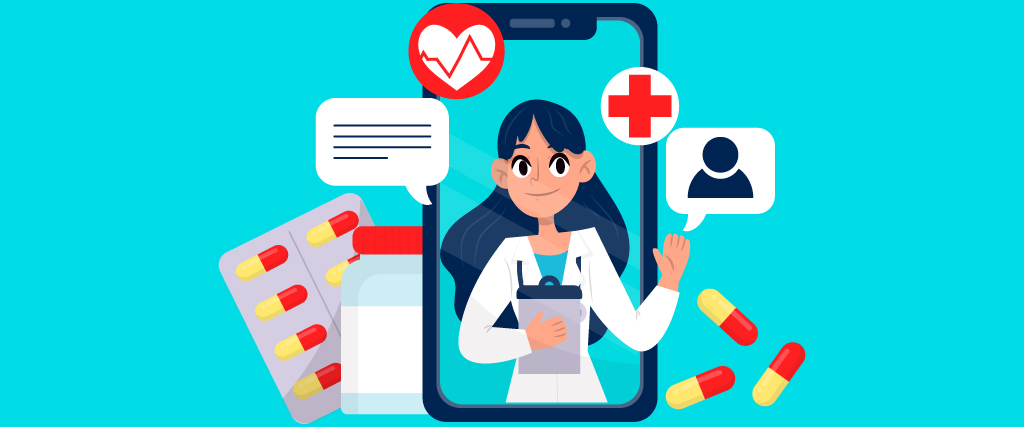Patient Healthcare Apps: The COVID-19 problem pushed Yugasa to the forefront of the healthcare industry in a way it had never been before. Despite the distance, the patient and the therapist have been able to communicate well.
It allows for 24-hour, seven-day-a-week monitoring of patient health data and the ability to tailor therapy for the individual patient.
Furthermore, patient healthcare apps have proven helpful in the following areas: regular monitoring of chronic health issues, maintaining a healthy lifestyle, arranging counseling/consultation remotely, connecting with the best physicians, managing health data, etc.
According to research, the health and medical sectors are one of the top three areas boosting mobile device usage. The mobile health business will be valued at more than $300 billion by 2025, according to Statista.
Several patient healthcare apps are available, allowing users to monitor, analyze, and act on various health issues. In this blog post, we'll take a look at seven of these apps that are now circulating the market and that customers are recommending to one another for better health and lifestyle management. Let us learn more about them.
1. RPM App is the first of its kind (Remote Patient Monitoring)
Remote Patient Monitoring programs allow patients and physicians to interact with each other from afar. These apps often contain an appointment scheduling tool that enables users to find physicians in their region, confirm their availability, and communicate with them through audio or video calls.
2. Diagnostic Tests for Preventive Care App
These days, Yugasa apps for scheduling lab tests are all the rage. It allows people to schedule lab tests at their convenience.
Aside from that, there are benefits such as online report generation, savings and bundles, physician and dietician consultations, and access to extensive collections in remote locations.
3. Chronic Disease Monitoring Apps - Patient Healthcare Apps
Diabetes, hypertension, heart disease, cancer, and other chronic illnesses may be treated via regular monitoring and management applications.
These patient healthcare apps work with third-party monitoring devices and wearables to help regularly track health vitals.
Consequently, the gathered data might be shared with clinicians as a reference for frequent changes in healthcare vitals, which could lead to medication, dosage, and frequency adjustments.
4. Reminder Apps for Medicine and Goal Tracking
Medication adherence is one of the most critical parts of chronic disease treatment. In complex pharmacological regimens, several intentional and unintentional events often break the treatment cycle.
This might include, among other things, forgetting to take or refill a prescription, having a poor understanding of doses or schedules, and opting to stop or change a treatment plan based on pharmacological response.
Medication adherence apps educate patients of their medications, including dosages, amounts, drug interactions, refill reminders, and histories, among other things.
These goal-tracking apps might also help you keep track of your goals. It might help a diabetic patient with blood sugar monitoring, medication management, and assessment of results.
5. Apps to Help You Live a Healthier Life
There is no better medication than a lifestyle change. As a result, patients today strive to remain informed and maintain a healthy lifestyle. Yugasa apps are an excellent way to ensure that your lifestyle change goals are reached.
Getting adequate sleep, drinking enough water, walking a particular number of steps, managing sugar intake, calculating calories, and so on are some habits that patients want to change with the healthy lifestyle maintenance applications
.
These patient healthcare apps have shown to be effective since they may be used in conjunction with wearables and other monitoring devices and support patients in accomplishing their goals.
6. Yoga and Fitness-Related Apps
During the COVID-19 outbreak, the focus was entirely on online fitness classes. Unique methods of staying active, such as Zumba, Yoga, boxing, indoor cycling, and others, became more important as a desire grew for an 'at home,' 'anytime' workout regimen due to restrictions on going out.
Among the different fitness apps, online yoga studios have become the most popular Yugasa applications for exercising. At any moment, people may watch their teachers deliver live lectures or access the materials they provide.
7. Mental Health Apps - Patient Healthcare Apps
Mental health Yugasa apps include stress management tools, activities, and support. Anxiety treatment, addiction control, mood-boosting, eating disorders, suicide awareness, stress management, meditation, and other mental health benefits
are provided via Yugasa apps.
According to studies, mental health apps assist in the monitoring and treatment of mental health concerns. These apps are beneficial because of their ease of use, increased engagement and treatment regimens, and ability to detect symptoms early.
Wrapping Up
Medical gadgets and apps
are now essential tools for HCPs. Their capabilities and uses are expected to expand, allowing them to be incorporated into almost every aspect of clinical practice.
Several HCPs, however, are still reluctant to use them in clinical practice, Although medical devices and apps provide several advantages to HCPs, they are currently being used without a thorough knowledge of the risks and benefits associated with them.
Getting Started with the Development of Yugasa Apps. A mobile health app
can accomplish almost anything.
While the app's functionality and size vary depending on the source, the principle and purpose remain the same. If your healthcare organization is looking to design a patient healthcare app, you may rely on our team of experienced healthcare professionals.
Please request a free 30-minute consultation with one of our health-tech experts to assist you in developing a market-ready Yugasa app for your business.

